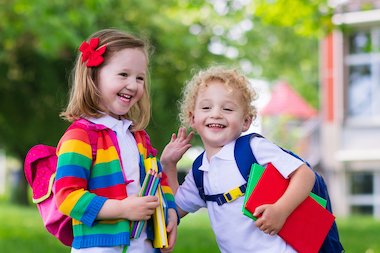School Readiness
- 5 Stars
- Supports home learning
Add to My Folder
New advice for preparing early years children for school

In November 2020, charitable foundation Kindred² released a report looking at the effects of COVID on school readiness. Through their study, they discovered that nearly half of all children were not ‘school ready’ on their first day in Reception. Although worries about school readiness have been around for a number of years, lockdown appears to have exacerbated the problem. Teachers who participated in the Kindred² study identified a higher percentage of children needing extra support and referred to speech, listening and attention, toileting, managing cutlery and general independence as particular areas of concern.
As with so many aspects of society, the COVID pandemic and resulting lockdowns have underlined inequalities in the lives of our children. Those with access to a garden and families able to spend time with them have generally fared better. Some have even thrived, although few children will escape completely unaffected. It is therefore important to recognise that this year’s cohort of Reception intake will probably be less school ready than usual – and to have faith that, given time, space and appropriate support most of them will catch up.
What is school readiness?
The term ‘school readiness’ has caused controversy for a number of years. Some practitioners object to the implication that the early years are no more than a prelude to ‘big school’, where the real business of learning takes place. According to this view, each stage in a child’s life should be seen as complete and important in its own right. The idea of ‘life readiness’ as opposed to ‘school readiness’ fits more comfortably with these ideas. If children are ready for life as they approach their fifth birthday, they will most certainly be ready for school.
Another issue that raises disagreement is the question of what skills and capabilities the child needs in order to be ready for school. In more recent years, there has been a shift towards a child-centred approach and recognition that school readiness means the child’s capacity to make a smooth transition to their new environment. Although some four-year-olds will have made progress with counting, phonics or writing names, school readiness does not require children to posses any traditional academic skills. In Ofsted’s 2014 survey Are you ready?, a primary school headteacher’s description of school readiness referred to capabilities such as listening, taking turns and responding to boundary setting. In other words, as long as children possess age-appropriate social, language, physical, self-care and self-regulation skills, they have everything they need to flourish within their new school environment.
Already a member? Sign in below.
Published 9 June 2021
Reviews
Rated 5/5 from 1 rating
You need to be signed in to place a review.
Angela Leeves
on 16 June 2021
School readiness
Really useful overview.
We've found all of these things to work really well but it's good to see it set down all in one place as a resource and to review our own practice.
The info for parents is also a really clear summary of all that the reception teachers in our local schools are advising.